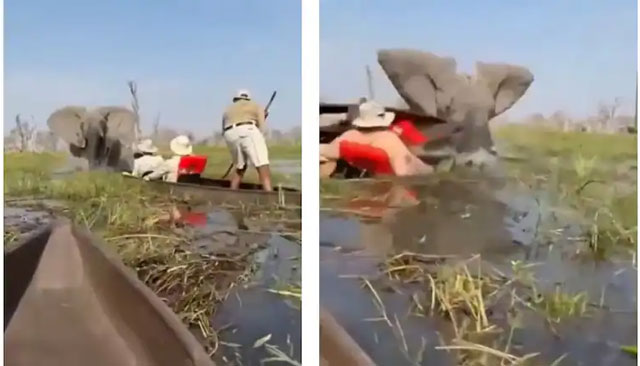Daijiworld Media Network – Okavango Delta
Okavango Delta, Oct 1: A mother elephant in Botswana’s wetlands charged at a group of tourists, including Americans and Brits, after they drifted too close to her calves during a safari canoe tour, overturning their vessels and leaving one woman briefly held underwater by the elephant’s trunk.
The incident occurred on September 27 in the shallow waters of the Okavango Delta, a UNESCO World Heritage site known for its rich wildlife. Dramatic footage captured by fellow tourists shows the elephant aggressively approaching the group as they ventured near her young. Despite frantic efforts by tour guides to steer the mokoros (traditional canoes) to safety, the elephant overturned two canoes, sending tourists into the water.

As the elephant walked away, it trampled a woman trying to stand, momentarily holding her underwater with its trunk before returning calmly to its herd. Several tourists’ personal electronics, including phones and cameras, were damaged or destroyed in the chaos.
A former South African game ranger described the tourists’ escape as “incredibly lucky,” noting that if the elephant had held the woman longer or used its tusks, the consequences could have been fatal. He added that the guides likely misjudged the safe distance from the protective mother.
Social media users highlighted the importance of respecting wild animals, especially mothers with calves. One wrote, “Do. Not. Mess. With. Elephants. They’re brilliant, intelligent, magical creatures, but they will take you out in a heartbeat if they feel threatened.” Another explained, “The matriarch was clearing the way for the herd to get water. Protection became heightened due to the calves.”
Botswana, home to about a third of Africa’s elephant population, lifted its ban on elephant hunting in 2019, citing a population boom due to conservation efforts. The Okavango Delta hosts roughly 130,000 elephants, and experts caution that elephants remain unpredictable, killing hundreds of people annually across Africa.
This incident serves as a stark reminder of the power and protective instincts of wildlife in their natural habitats.